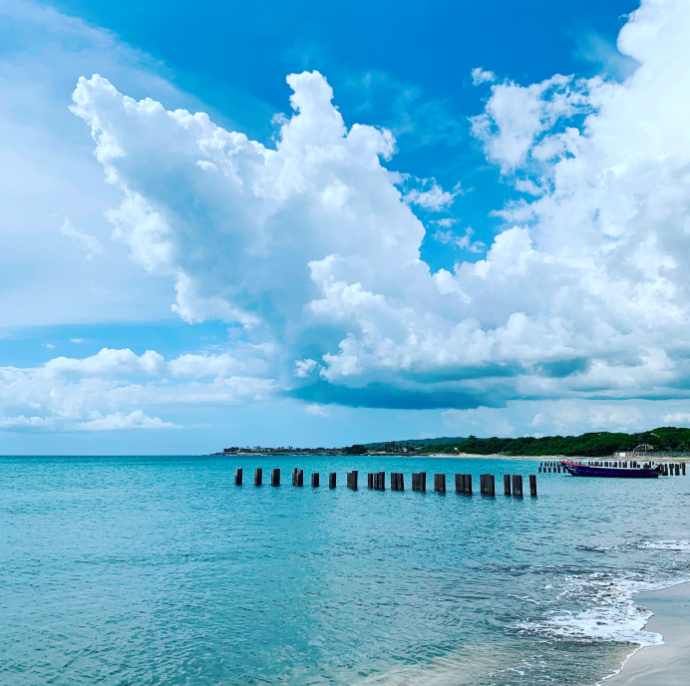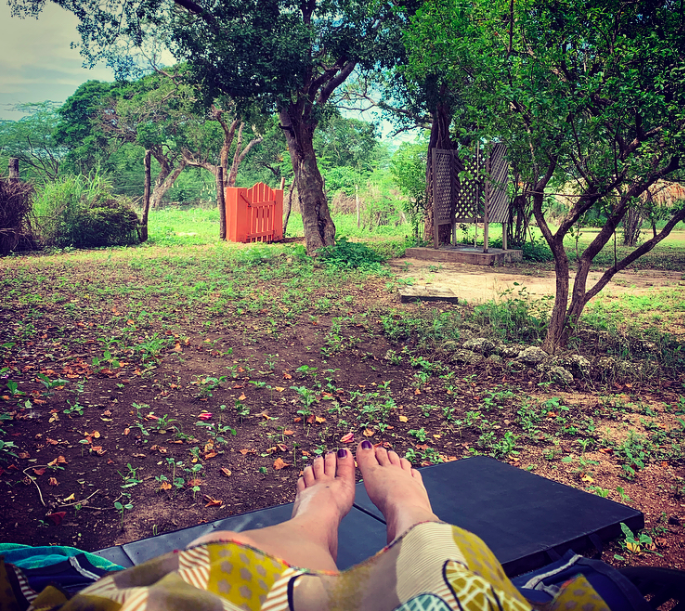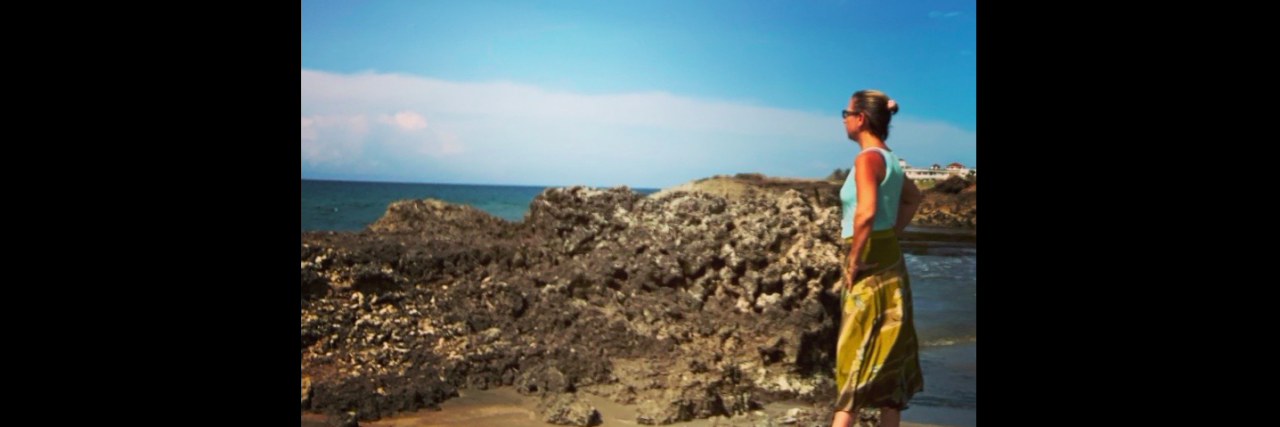What Happened When I Sought Alternative Mental Health Treatment Abroad
Editor's Note
Any medical information included is based on a personal experience. For questions or concerns regarding health, please consult a doctor or medical professional.
Can one trip change your life?
There was a moment at the airport as I waited for my flight to Jamaica that I wondered — have I lost my freaking mind?
I was riding solo this trip, reeling from an unholy midlife trinity: menopause, empty nest and marital separation. As I looked around at my fellow travelers, feelings of isolation and anxiety grew. I was alone, surrounded by joyful honeymooners, intact vacationing families and Christian missionaries in matching pink T-shirts. And it was too late to turn back.
This trip was something I had thought about for over a year, ever since I struggled with a major depressive episode. I researched it for months, did my due diligence, and yet still I felt nervous, unsure. Was I being impulsive? Was this just a midlife crisis? What would my friends and family think if they only knew the truth?
I wasn’t headed to an ordinary wellness retreat or vacation. I was flying to Treasure Beach, Jamaica, where I would take part in MycoMeditations psilocybin-assisted retreat. I was going to get high.
Only a couple people (including my children) were fully aware of my plans. I didn’t want to worry anyone or endure their judgment or anxiety. I think most people assumed I was headed to a luxury resort. However, this island getaway didn’t have hot water, AC or reliable Wi-Fi. And I would be sharing my room with a complete stranger. But none of that mattered. I wasn’t looking for luxury or comfort; I was looking for relief. And I believed traveling 1,500 miles to trip with nine strangers would provide that relief.

Psilocybin is a hallucinogenic substance often lovingly referred to as magic mushrooms. Along with LSD, it was popular with hippies in the 1960s. But I came of age in Ronald Reagan’s conservative America. Unlike the Baby Boomers or Millennials, I was stuck in Gen X. Forget about sex, drugs and rock-and-roll. Our first association with sex was AIDS (and death), and we were hammered with anti-drug just say no messaging. Adolescence is generally a time for experimenting and taking risks, but I was grieving the death of my father. Instead of partying on Friday and Saturday nights, I babysat and saved up money for college. And I became depressed.
Needless to say, I am not the poster child for psychedelics or illegal substances. Other than drinking alcohol, I didn’t do drugs. I never even smoked weed in college. It was only after years of chronic, debilitating pain brought about by late-stage Lyme disease that I sought out medical cannabis. After about six months of micro-dosing high CBD strains, I no longer needed to take Valium, Vicodin, Codeine, muscle relaxants or other prescription anti-inflammatories. For the first time in years, the tight, tense muscles in my neck and back relaxed, and my overactive pain receptors seemed to calm down.
That’s when I decided maybe it was time to just say yes to other plant medicines, including psychedelics.
Was I looking for a quick fix? Absolutely. I had spent six years in constant pain, searching day in and day out for some kind of cure for my chronic Lyme. And I had spent tens of thousands of dollars in the process. Depression plagued me since my teens, and I had been in therapy on and off for 20 years (ever since I experienced postpartum depression). I spent years taking antidepressants and experiencing all kinds of adverse side-effects (dry mouth, insomnia, weight gain, fatigue, constipation and loss of libido). I had investigated every nook and cranny of my psyche. I finally understood that my father’s chronic illness — and then death — left me with post-traumatic stress disorder (PTSD). And all of that trauma undermined my immune system and wreaked havoc with my mental and physical health.
However, knowing the root causes of my trauma and recognizing my triggers were not enough. I simply could not release the shackles of my mind, especially not since perimenopause had kicked in eighteen months previously. I wanted to experience pleasure and be happy. I truly believed I possessed a life full of opportunity, privilege, luxury, creativity and love. Yet no matter how much I meditated or embraced positivity and gratitude, I could not turn off the intrusive thoughts overpowering my brain.
In fact, these constant intrusive negative thoughts were me. I had never lived without them.
Researchers now believe that people who live with depression and other mood disorders have an overactive default mode network in the brain. Psychedelic research has proven promising, indicating that even a single guided psychedelic trip can reset the brain by disrupting these repetitive loops. It is these rigid, fixed negative thought patterns that keep a person locked inside depression and anxiety for years, and sometimes even a lifetime.
With chronic illness, I was always open to trying new treatments. Yet part of me remained skeptical. Could getting high three times during one week really reset my brain? It was a long way to go and a fairly steep price to pay, and there were no guarantees. That’s why I sat in the airport and wondered if I was losing my freaking mind.
When I booked the trip, I was desperate to try something different. My life was not working as is. I convinced myself that even if I didn’t get positive results, this trip would make for a heck of a story. As a writer, I’ll pretty much do anything for a good story. Plus, I felt like I had nothing left to lose. My life was in shambles. I was starting over, alone, after thirty years. I was in a grief spiral and worried I’d experience another major depressive episode. I wasn’t looking to get high just for fun. I felt like I needed to get high. And I needed it sooner rather than later.
This is where I offer warnings, lest you think I am advocating the widespread or irresponsible use of psychedelics. I am a strong advocate for using plant medicine with guidance, facilitated by professionals, including therapists, who understand the importance of integrating the experience. People can experience bad trips while on magic mushrooms. It’s essential to have support through these moments, which can be terrifying. And it’s not a good idea for people with bipolar disorder or a history of psychosis.
I went on the MycoMeditations psilocybin-assisted retreat (which does have an application process) with quite a bit of trepidation and fear. But once I arrived, that all changed. I felt completely safe. So much so, I didn’t lock the door to my room. The staff was incredibly professional and also extremely compassionate, kind and intuitive. They worked with each of us to ensure the best possible outcome for our individual experiences. They also helped us understand our expectations and set our intentions.
When it came time for our first trip, I was hoping for the best, but prepared for the worst. I had resigned myself to the fact that I would probably hate being out of control, and it might even trigger anxiety or a panic attack. None of that happened. In fact, I didn’t feel anything other than extreme calm during our first trip. We had received a low dose to get a feel for how we would react, and because of my extreme sensitivity to drugs, I asked for even a smaller amount than the others.
During the second attempt two days later, I received an increased dose. I reclined on a lounge chair under a tree, put on my eye mask, and listened to the Johns Hopkins psilocybin Spotify playlist. My senses were heightened enough that the meditative music brought me to tears, and made me feel temporarily ecstatic. But still, nothing magical occurred. I didn’t have any visual disturbances, and I never felt high. After years of being in pain, I often listened to music through headphones as a way to escape my body. This trip felt like that – just another relaxing guided meditation.
Now instead of feeling fear, I was feeling frustrated. I didn’t travel all the way to Jamaica to play it safe. I wanted to have an authentic psychedelic experience. After conferring with the facilitators, we decided to up my dose considerably. By this time, I trusted the process and the people and knew I was safe and would be protected.
The third time proved to be the charm. This trip kicked in fast. I was listening to the same psychedelic soundtrack, only this time I was experiencing all those things people talk about when they are high. I felt as if I were strapped on a thrilling roller coaster ride. Mesmerizing geometric patterns were pulling me into the music and out of my body. I was becoming disengaged and detached from my overly-analytic brain.

It’s cliché to say it, but here goes — I felt at one with the universe.
I felt light. Content. Connected. Whole. There was no separation between me and the trees or the birds or the group of people tripping with me. I was utterly beyond my body, and yet, my awareness remained intact. Light and love were right there available for all of us. Why didn’t we choose this option more?
When it started to rain, I moved from my lounge chair to a small covered porch. I put my pillow on the ground and laid down on it. I took my face mask off and watched our group going about their own trips. It was like watching a surreal reality TV show, and I continued to grin, chuckle and shed tears. I loved these people so much. We had bared our souls to each other and shared this enormous, life-changing experience. We had become a family.
The sound of the rain, mixed with the chatter of our group, felt like a lullaby. I fell in and out of a light sleep. I had no idea how long the trip would last, but I told myself — go with it and enjoy this ride. I had no fear, no anxiety, no doubt. I wasn’t in any rush. And I didn’t have to be anywhere but here. I didn’t have to do anything other than this. I just had to be. And being was enough.
That’s when it hit me. For the first time in six years, I did not feel one ounce of pain in my body. Immediately, years of resentment, rage and grief tied to my chronic illness dissipated.
I grabbed my journal and wrote:
I don’t know why I expected my trip would be one of horror and pain. The mushroom whispered — you have endured enough horror and pain. This trip is about release, love, acceptance and peace.
Not all my insights were profound (even though they felt so). As I opened and closed my eyes, I kept seeing an intricate beehive pattern over and over again. It was as if I was living “Under the Dome” or in “The Truman Show.” I could see behind the glitches in the matrix. Then the beehive pattern formed a giant soccer ball, and I had an epiphany. Wow! This is why soccer is such an internationally-revered sport. The soccer ball is a sacred geometric symbol! And it brings us together and creates harmony!
Like I said, not all insights are equally profound. But even these silly insights brought me relief. It was OK to be foolish. It was OK to be unselfconscious. It was OK to surrender entirely to the process.
After years of pain and wanting to escape my physical being, I suddenly loved every beautiful, microscopic piece of my body. And I loved my brain. It had protected me for so many years and kept me functioning against all the odds.
But it was time for a reboot. And that afternoon, my brain was definitely rebooted.
I can say that my first official psychedelic trip was immensely enjoyable. Even so, I cried for five hours straight. It felt as if my entire body was weeping. As if I was purging something heavy and dark. Something ancient I had been carrying around for centuries. Something that was never mine to carry.
Luckily, I didn’t feel pain, have disturbing visions or relive any trauma. My brain was simply defragmenting itself while I enjoyed a spectacular show of light and music. It was pure bliss.
I should mention, psychedelic experiences vary. Not everyone in my group had purely pleasurable or positive experiences. I consider myself to be very lucky. But researchers believe the processing of even negative experiences (i.e. “bad trips”) ultimately has a positive impact. The ultimate goal of using plant medicine is to disrupt old patterns, creates awareness and move towards healing. Sometimes letting go involves facing your demons. And it can be painful and scary.
A week later, I am still feeling the glow of my trip. Thinking about my time in Jamaica brings a dopey smile to my face. When I chat with my fellow mushroom travelers and talk about our re-entry into the real world, I get emotional. That week absolutely changed my life. Deep in my bones, I know I will never be the same. How can I go back to the way things were, when I have suddenly seen how things can be?
My default mode network has gone silent for the first time in my life. I keep joking that “they broke my brain in Jamaica.” Who am I without the doubt, anxiety, worry and fear? The darkness has been a constant companion, and I am happy to finally part ways with her. But it’s going to take some getting used to.
I don’t know how long my default mode network will remain offline. At the moment, a quiet mind is helping me get through an extremely stressful and emotional period of my life. Instead of ruminating or staying in anger, hate or despair, I feel light and calm. I find myself singing spontaneously in the shower. I smile at strangers on the street. I feel the most intense and magnanimous love for everyone — even those who have hurt me — and whom I have hurt.
While I am going through a dark and challenging transition, I am no longer consumed by the darkness. And for the first time, I see how easy life can be if I just stop resisting. I’ve fought my entire life to hold onto things. Maybe now I am supposed to let go.
As the mushroom whispered to me in the rain – you have already endured enough horror and pain. Now is the time for release, love, acceptance and peace.
Learn more about MycoMeditations psilocybin-assisted retreats.
Other resources:
“How to Change Your Mind: What the New Science of Psychedelics Teaches Us About Consciousness, Dying, Addiction, Depression, and Transcendence” by Michael Pollan.
“A Really Good Day: How Microdosing Made a Mega Difference in My Mood, My Marriage, and My Life” by Ayelet Waldman.
The Center for Psychedelic & Consciousness Research at Johns Hopkins.
The Multidisciplinary Association for Psychedelic Experiences (MAPs).
Photos courtesy of the author

